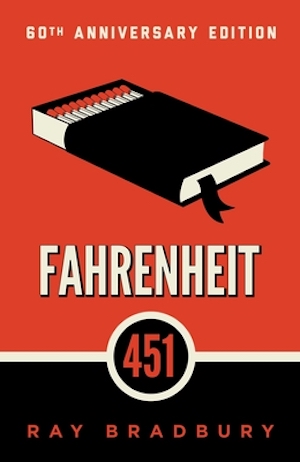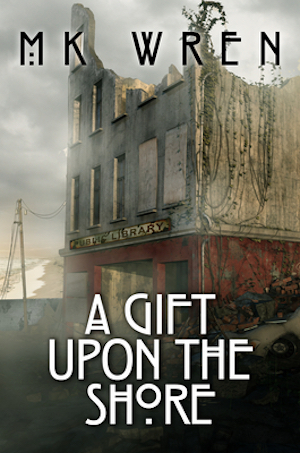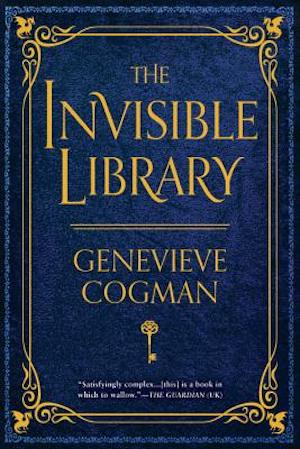Recently, news went out that the Waterloo Undergraduate Student Association is determined to reallocate the room currently occupied by the Clubs Library. Among the collections housed there: WatSFiC’s extensive science fiction and fantasy library, portions of which date back to the 1970s. One hopes that the library will find another home, or that other accommodations can be made before the collection is broken up or lost.
Science fiction and fantasy fans and writers have been generally supportive of libraries and especially of SFF collections. Book lovers are often “keep everything” proponents and have a hard time admitting that deaccessioning is sometimes necessary. One might expect that libraries, and library disputes, would feature in SFF novels… as they have. Here are five works about books and libraries, their friends, and their bitter enemies.
Fahrenheit 451 by Ray Bradbury (1953)

Modern society offers its citizens every entertainment they might want, flickering on the great screens enshrined in every household. Entertainment needs are so completely satisfied that other media are unnecessary. Indeed, they could be dangerous to society, teaching unconventionality, even immorality. Books are the worst dangers. Books must go.
Fireman Guy Montag enforces the ban on books with a flamethrower. Whenever an illegal trove of books is uncovered, Guy and his co-workers are there to burn it to a cinder. At least one owner chooses to burn alongside her books, refusing to leave them behind when commanded.
One would think that Guy would be content with his loveless marriage, diet of endless shallow entertainment, and the socially sanctioned brutality of his occupation. Yet he is not. Unfortunately for Guy, his society sees deviation as equivalent to treason.
***
A Gift Upon the Shore by M. K. Wren (1990)

The global thermonuclear exchange was as destructive as it was unexpected. Most humans died, either immediately or in the horrific aftermath. Mary and Rachel survive in part thanks to preparation—they have months of supplies on hand—but mostly because they were lucky enough to escape the immediate and delayed effects of the nuclear strikes.
Post-holocaust life is inherently precarious. Numbers seem to offer security. However, the community of survivors closest to Rachel and Mary is a commune of well-meaning religious fanatics. The faithful might well make room for newcomers. But there’s a catch. Miriam, the community’s leader, sees Rachel’s carefully preserved library of pre-war books as evil. It’s a danger to her community that is best consumed in flames.
Whether or not the library’s owner agrees….
***
The Invisible Library by Genevieve Cogman (2014)

Many timelines exist, many featuring literacy and books. Books being perishable, preservation is not guaranteed. This is where the Invisible Library comes in. It guards an unparalleled collection drawn from a myriad of universes.
The existence of the Library is a close-held secret. The librarians do not bother with trifling formalities like asking permission before appropriating books. The important thing is that the books are saved.
Field agent Irene is dispatched to a chaos-tainted version of London to retrieve a unique version of Grimms’ Fairy Tales. Complications ensue: the vampire who possessed it has been murdered, the notorious cat-burglar Belphegor may be responsible, and Vale, the local answer to Sherlock Holmes, is taking all too keen an interest in the case. All very worrisome, but not nearly as much as the revelation that Alberich, the Invisible Library’s greatest traitor, is also in search of the Grimms’ collection.
***
Library War by Hiro Arikawa (2006)

The Media Improvement Act provides the Improvement Special Agencies of the Ministry of Justice with sweeping powers of censorship and confiscation, including the power to suppress criticism of the Act. However, the bold visionaries who wrote the Act inadvertently left a legal loophole. Hence the existence of the Library Defense Force, legally empowered to assemble inclusive archives. More importantly, the Library Defense Force has the right to arm its members. There will be no repeat of the Nightmare at Nino!
Inspired by an encounter with a Library Defense Force stalwart, Iku Kasahara joins the Library Defense Force. The athletic bookworm discovers that the reality of the Libraries Wars is very different from the cinematic adventures she might have imagined. Both sides cheerfully resort to contrived legalisms to get their way. While neither side seeks out lethal conflict, both Ministry of Justice and Library Defense Forces are well-equipped to dole it out. Most alarmingly, the Ministry has a ringer within the Defense force. How can an organization protect itself when one of its commanders is working for the enemy?
***
Ascendance of a Bookworm by Miya Kazuki (2015, ongoing)

Urano Motosu loves books to distraction. Indeed, so closely is she focused on her beloved books that only an attentive friend’s intervention saves her from being stuck down by that scourge of modern Japan, Truck-Kun. The rescue is for naught. Returning home, Urano dies under an avalanche of books during a minor earthquake. Live by Mount Tsundoku, die by Mount Tsundoku.
Urano wakes to find that her soul is now housed in the body of sickly peasant girl Myne. Urano is more than happy to abandon her old life for a new one in a fantasy universe, provided she still has books to read. But alas…Myne’s culture is technologically backward and as far as Urano can tell, it lacks both literacy and anything resembling a publishing industry. Urano could try to adapt to her new society. Instead, she sets out to re-create from scratch the means by which she can return to her bookish ways.
Many impediments await, not least of which is that knowing that something can be done is very different from knowing how it can be done.
***
Books, and libraries, their preservation and destruction, are topics in which writers have a keen interest. Five examples barely scratch the surface. Feel free to list other examples in the comments below.
In the words of Wikipedia editor TexasAndroid, prolific book reviewer and perennial Darwin Award nominee James Davis Nicoll is of “questionable notability.” His work has appeared in Publishers Weekly and Romantic Times as well as on his own websites, James Nicoll Reviews and the Aurora finalist Young People Read Old SFF (where he is assisted by editor Karen Lofstrom and web person Adrienne L. Travis). He is a four-time finalist for the Best Fan Writer Hugo Award and is surprisingly flammable.










